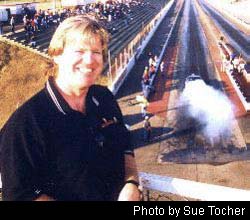
Right Neighborly of 'Ya
5/8/06

 wo years ago, while driving to Huntsville Dragway, I noticed surveyor stakes dotting the fields alongside the wide-open country road that leads to the north-Alabama eighth miler. ‘Uh oh,’ I distinctly recall thinking, ‘That’s the first red flag.’
wo years ago, while driving to Huntsville Dragway, I noticed surveyor stakes dotting the fields alongside the wide-open country road that leads to the north-Alabama eighth miler. ‘Uh oh,’ I distinctly recall thinking, ‘That’s the first red flag.’
Not being a local, I make it out to Huntsville maybe two, three times a year, and last summer I saw the stakes replaced by cleared rights of way. By fall, the first curbs had been poured and subdivision access roads paved. Red flag numbers two and three were flying high.
In April, heading to the Outlaw Nationals, I found the first few houses already standing and sales offices—complete with manicured green lawns, over-flowing flower beds, and aggressive salespeople (no doubt, none too eager to discuss the dragstrip’s proximity)—open for business. ‘Now it’s just a matter of time,’ I thought. ‘Someone’s bound to try throwing a red flag over drag racing out here.’
Little did I realize my initial hunch was dead on, even back in 2004, when one of the track’s newer neighbors had already set the governmental wheels in motion to establish legislation that recently passed to limit operations at Huntsville Dragway.
Apparently, Alabama law prohibits county commissioners, in this case those of Madison County, from creating laws or raising taxes independent of the State Legislature. So this former Chicago-based neighbor, Michelle Pavlik of Upland Circle, about a mile from the track and rumored to be involved in the local real-estate market, successfully lobbied the
Legislature for a bill passed in May 2005 and signed by Gov. Bob Riley (R), giving Madison County the power to create a noise ordinance.Pavlik’s effort culminated in the passage of county legislation May 1, requiring Huntsville Dragway to end racing by 11 p.m. on Fridays, midnight on Saturdays, and 10 p.m. Sundays through Thursdays. Additionally, as of Jan. 1, 2007, all vehicles racing at the dragstrip must have mufflers installed, though a provision does allow the dragway up to three major, multiple-day events during a calendar year with racing ending at midnight, and certain cars at those events will be allowed to forego the mufflers. Also, sound from the track’s P.A. system must not impose on nearby residents and all vehicles belonging to racing participants and spectators must park on track-owned or -leased land. In other words, public roadside parking is prohibited. Violations of any condition can bring fines of up to $1,000 a day for the track and through potential court action could cause it to lose all privileges.
Still, according to the Huntsville Times, track owner George Howard considers the terms acceptable and in an online message board post, he assured the track faithful that “everything is going to be OK at Huntsville Dragway. We are going to stay open and race every week.”
I certainly hope so. After being in continuous operation since 1959, it would be a shame to see Huntsville go the way of Southeastern and Savannah Dragways, both of which succumbed this year to encroaching development after decades of operating in what previously were safe rural-Georgia environments. I fear this legislation—and the onerous penalties it provides for—may be the thin end of the wedge that eventually lands Huntsville Dragway on one of those “Forgotten Dragstrip” pages in the magazines.